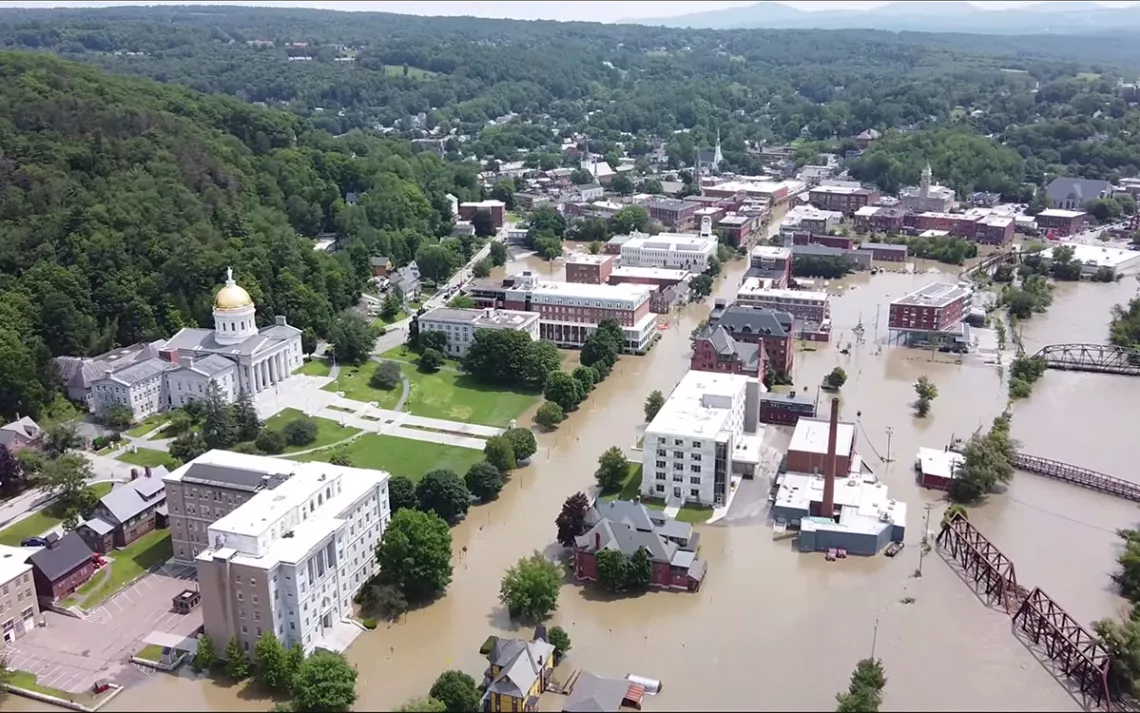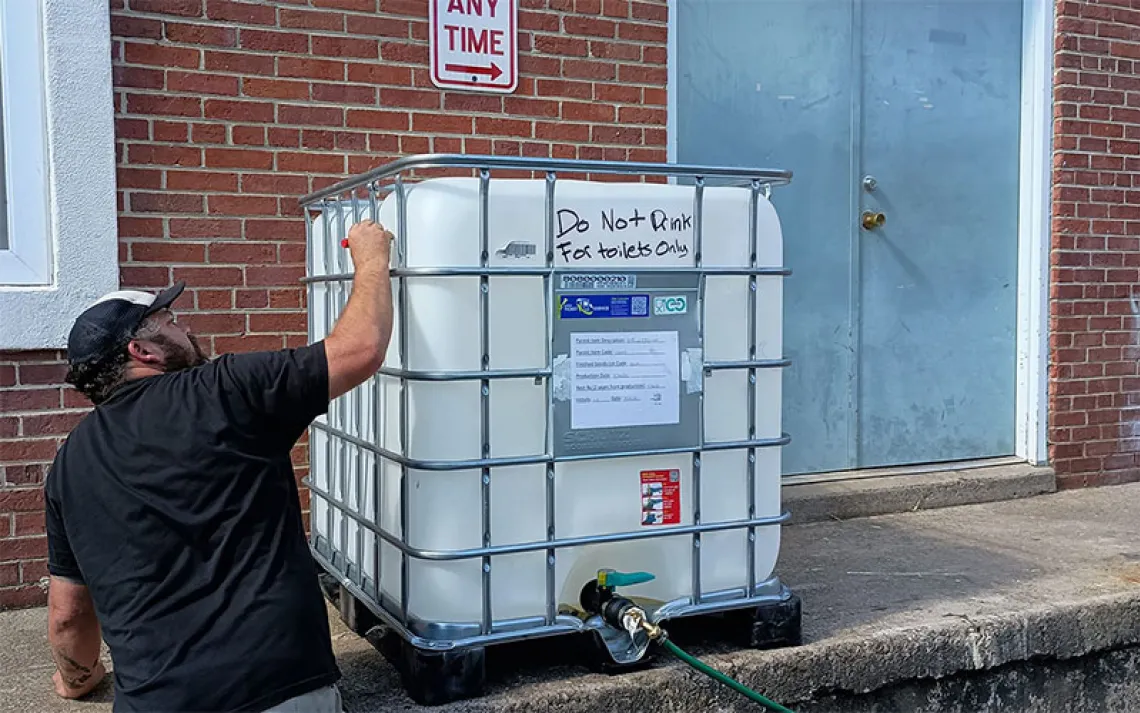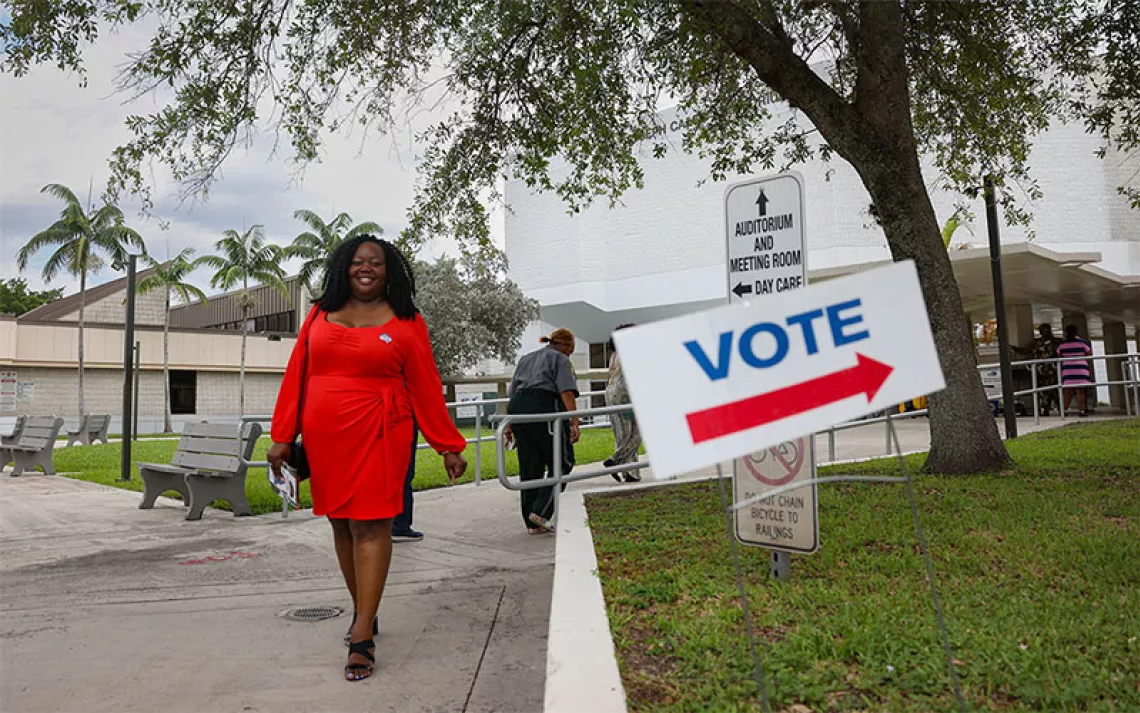Vermont, Other States Push for “Climate Superfund” Bill to Hold Polluting Companies Accountable
Climate-driven extreme weather is wreaking havoc across the country. Lawmakers want fossil fuel companies to pay.

Flooding in Montpelier, Vermont, in July 2023. | Photo courtesy of Vermont Agency of Agriculture, Food and Markets via AP
In 2023—Earth’s hottest year in recorded history—extreme weather events wreaked havoc across the United States. According to the National Oceanic and Atmospheric Administration, the country saw an “unprecedented number of billion-dollar disasters” in a single year, including severe flooding in the Northeast in July.
One state in particular—Vermont—serves as a cautionary tale for those events, and for what may become more common for other states in a warming planet. The state saw catastrophic and widespread flooding unlike anything residents had seen before. At one point the capital of Montpelier was under water with downtown streets turning into rivers. The city got about half a foot of rain in 48 hours; the Winooski River crested at over 20 feet and overflowed its banks, flooding the downtown district. Rainfall soaked some parts of the state with even more precipitation, essentially dumping two months’ worth of rain in two days.
“We knew that it was going to rain a lot, but it wasn’t part of a named storm or anything. The level of damage of the water took everyone by surprise,” state senator Anne Watson, who served as mayor of Montpelier from 2018 to 2023, told Sierra. “People had to evacuate out the backs of their houses, scrambling up wooded hillsides. People couldn’t get to the shelters that had been opened because so many of the roads were cut off. Bridges washed out; culverts blew out. There were some dams that failed; others did their jobs and held. But it was still surprising and very scary for a lot of folks.”
Six months later, the state is still assessing the damage costs. Watson said it will be on the scale of hundreds of millions of dollars at minimum. “The costs to clean up are enormous, much more than what individual Vermonters, businesses and municipalities, and even the state can afford. Dozens of towns are reporting huge budget deficits,” she said during a mid-January press conference at the Vermont State House.
Now, a legislative effort is underway in Vermont and several other states that, if successful, would require some of the largest fossil fuel companies to help pick up the tab for climate adaptation and resiliency measures—including costs associated with climate-related disaster recovery and preparation. It’s called a “climate Superfund” bill. Modeled after the federal Superfund program, the legislation compels corporate polluters to pay their fair share of damage costs stemming from climate pollution. Presently, these costs fall entirely upon taxpayers and the public.
“Right now, Vermonters are footing this bill,” Watson explained. “I’m thinking of this exactly as we would think of a chemical spill, where the company that is responsible for the chemical spill needs to pay not only for cleaning it up but also for the damage they have done to our community. This legislation will mean that those who are responsible for the product, which is fossil fuels, will be made to pay for the damage that their product has caused.”
Watson is a lead senate sponsor of S. 259, which if passed would establish Vermont’s first Climate Superfund Cost Recovery Program. The legislation was first introduced at the start of the legislative session in January (along with its companion bill in the House). It imposes a one-time fee on major fossil fuel producers—companies like ExxonMobil, Chevron, and BP—responsible for more than a billion metric tons of greenhouse gas pollution from 2000 through 2019. The funds collected through the program would go toward climate adaptation and resiliency projects to be determined by the state’s Agency of Natural Resources. While the bill does not peg a specific dollar amount for its overall cost-recovery demand—a task it leaves up to the state treasurer to determine—an initial rough estimate from the Vermont Public Interest Research Group (VPIRG) suggests the figure could be around $2.5 billion.
Collecting these funds from corporate climate polluters would bring in much needed revenue to the state. Bill proponents emphasized it is not a carbon tax, which puts a price on emissions going forward and allows polluters to pass costs along to consumers. The climate Superfund approach, by contrast, is backwards looking.
“This bill is about dealing with the consequences of emissions that have already happened,” Anthony Iarrapino, a Vermont-based lobbyist with the Conservation Law Foundation, told Sierra. He said he expects the oil and gas industry and its allies to seize on the tax messaging. “It’s an easy political-public relations tactic to relabel something as a tax in order to make it unpopular. But it’s very inaccurate to call it a tax.”
The concept, campaigners explained, is akin to the same that is embodied in the federal Superfund law and analogous state-level programs, which hold corporate polluters strictly liable for cleaning up environmental contamination they caused. “It is just like a company that creates a toxic waste dump at the federal level has to grapple with the Superfund and ultimately has to pay to clean it up,” said Ben Edgerly-Walsh, climate and energy program director at VPIRG. Or to put it even more simply, the legislation is “rooted in a value you learn in kindergarten, which is, if you make a mess, you clean it up,” Jordan Heiden, VPIRG’s climate campaign manager, said during a November webinar.
Vermont lawmakers backing the climate Superfund bill say this principle should be extended to hold Big Oil accountable for climate pollution and the damage it inflicts upon the state. Burlington, Vermont, is among the fastest-warming cities in the nation, and winters are now on average seven degrees warmer than they were 50 years ago, extending opportunities for exposure to tick-borne diseases and dampening seasonal snow sports. The Northeast region has seen the largest increase in the number of extreme precipitation events since the 1950s, according to the Fifth National Climate Assessment. Heavier rainfall and severe flooding are becoming more common in Vermont as the climate warms, and the associated damage costs are piling up. A 2021 study from the University of Vermont estimated that flooding could cost the state nearly $5.3 billion over the rest of the century.
“Big Oil knew decades ago that their products would cause this damage,” Watson said at the press conference announcing the bill. “It is only right that they pay a share of the costs to clean up this mess.”
That message seems to have resonated among her colleagues in the legislature. The bill already has 107 cosponsors, including 20 out of 30 senators and 87 out of 150 representatives. Should it end up passing during this legislative session, the bill could likely survive a potential veto from the state’s Republican governor, Phil Scott.
*
Vermont is not the first state to introduce a climate Superfund bill. A 2021 federal legislative proposal led by Senator Chris Van Hollen (D-MD) to make fossil fuel companies pay for climate-related damage costs inspired a handful of states to pursue the same path. New York first introduced its Climate Change Superfund Act proposal in 2022. Last year, Maryland and Massachusetts introduced similar bills, and now Vermont is doing the same.
New York’s bill has progressed the furthest. It passed the state senate in 2023. Despite a push from climate advocates and municipal officials, Governor Kathy Hochul did not include the measure in her executive budget plan released in mid-January. The bill now has to be repassed in the senate and then passed by the state assembly. “We’re pushing the senate to move quickly, and we have over 50 assembly sponsors,” Blair Horner, executive director of New York Public Interest Research Group, told Sierra.
In Massachusetts, Democratic lawmakers Representative Steve Owens and Senator Jamie Eldridge are lead sponsors of the state’s climate Superfund legislation (H.872/S.481). Like the New York bill, it seeks to recover $75 billion over 25 years from major fossil fuel companies, with at least 40 percent of the funds going toward adaptation projects that directly benefit environmental-justice communities. Projects could range from urban greening investments to protecting sewage treatment plants to addressing climate-related public health challenges. The legislation is currently pending before the Environment and Natural Resources Committee; if it fails to move out of committee this session, climate campaigners say they hope to try again next year.

Sign up to receive Sierra News & Views
Get articles like this one sent directly to your inbox weekly.
With this action you affirm you want to receive Sierra Club communications and may vote on policy designated by the Sierra Club Board.
Meanwhile, Maryland’s version of the bill is set to be introduced this session under a new name. Now called the Responding to Emergency Needs From Extreme Weather (RENEW) Act, the legislation hones in on a message of climate resilience, said Jamie DeMarco of Chesapeake Climate Action Network Action Fund, a regional environmental group leading the legislative campaign. As with the previous version of the bill, it aims to recover $9 billion over 10 years from climate polluters.
In identifying who those polluters are, the climate Superfund concept draws upon the groundbreaking “Carbon Majors” research pioneered by Richard Heede. This comprehensive accounting attributes historical carbon pollution to large fossil fuel companies. As the text of the New York bill explains, “It is now possible to determine with great accuracy the share of greenhouse gases released into the atmosphere by specific fossil fuel companies over the last 70 years or more, making it possible to assign liability to and require compensation from companies commensurate with their emissions during a given time period.”
Backers of the strategy see it as a complementary approach, and perhaps a more efficient one, to the climate liability litigation targeting Big Oil in the US. Starting in 2017, municipalities and states have taken companies like ExxonMobil, Chevron, and Shell to court over climate damages and alleged deception. More than two dozen cases are currently pending; some seek to recover climate-related damage costs, while others are brought strictly under state consumer fraud statutes or otherwise feature a combination of consumer fraud and cost-recovery approaches. This litigation, like the climate Superfund legislation, is grounded in the understanding that the fossil fuel industry knew long ago about the dangerous climate consequences of their products yet publicly denied and downplayed those risks.
“For years, these companies have misled the public about the real and significant impacts of fossil fuels on our environment and public health,” former Vermont attorney general T.J. Donovan said in announcing the state’s consumer protection lawsuit filed against major oil and gas companies in September 2021. New York City filed a similar consumer fraud case against Big Oil in April of that year, while Massachusetts sued ExxonMobil under the state’s consumer protection law in 2019. In Maryland, Anne Arundel County as well as the cities of Annapolis and Baltimore have sued fossil fuel producers in a hybrid cost recovery and consumer protection approach. All of these cases and other climate suits against the industry have been slow-moving, tied up in procedural wrangling.
Since states and municipalities are plaintiffs, they “bear the burden of proof,” Iarrapino explained. “It leaves Big Oil with the full bag of tricks that well-funded corporations and the law firms that make millions of dollars every year defending them have at their disposal,” he said.
If a state were to pass a climate Superfund bill, and the industry then challenges it in court, Iarrapino said that would “turn the tables” because the burden of proof would instead be on Big Oil. “You’re saying, if you, polluters, want to get out of complying with this law, then you bring a lawsuit,” he said. Constitutional challenges to states’ authority to make polluters pay for environmental damage, he added, are generally easier to resolve, and there is well-established case law on Superfund litigation and its strict liability standard.
Vermont’s climate Superfund bill will be taken up by the state’s House and Senate Judiciary Committees, which are both chaired by lead sponsors of the legislation. The bill’s significant early support in the legislature is perhaps not a surprise given the scale of last year’s flood damage that impacted all 14 counties across the state. “This is going to be bringing more money into the state, and we desperately need that,” Watson said of the bill’s cost-recovery aim.
“If Vermont’s legislation or New York’s or any of these bills actually get enacted,” VPIRG’s Edgerly-Walsh told Sierra, “it would be the first time in the United States that fossil fuel companies would be held financially accountable for the climate crisis.” That, he said, “would be a game changer.”
 The Magazine of The Sierra Club
The Magazine of The Sierra Club



